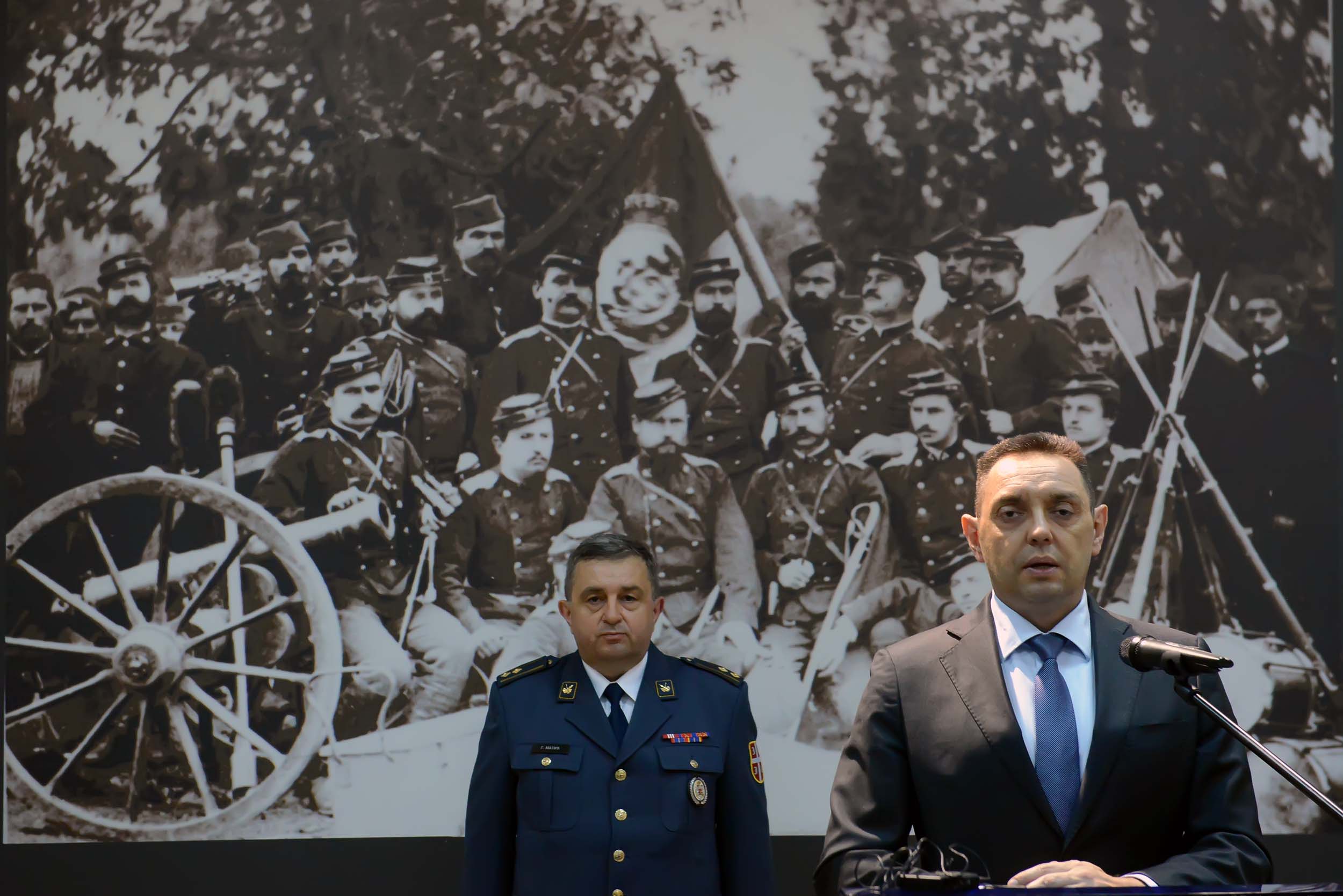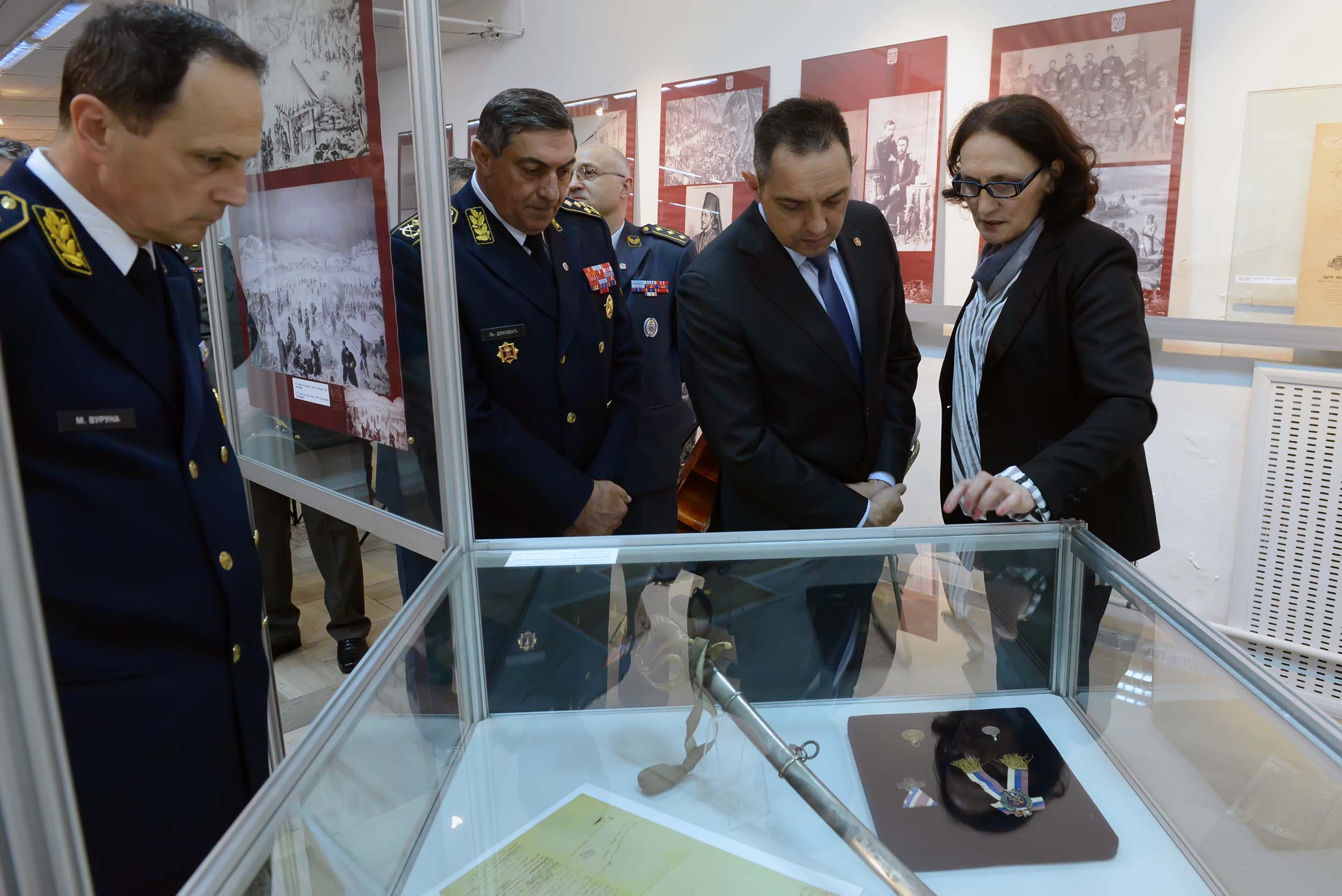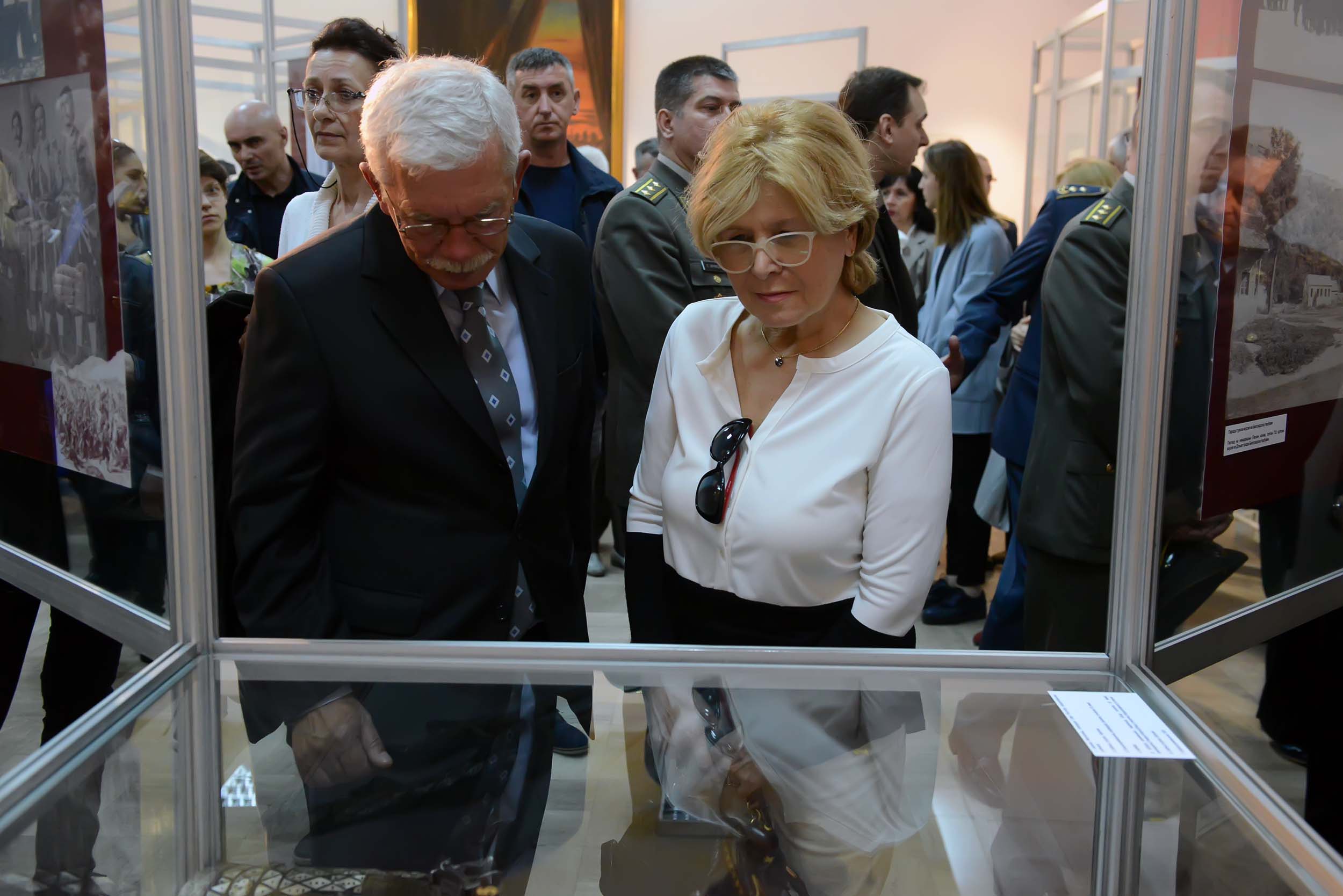19.04.2018.
The word freedom determines Serbian people, our past and our future
On the occasion of the Serbian Armed Forces Day, at the Military Museum in Kalemegdan, the exhibition “Serbo-Turkish War 1876-1878 and acquisition of independence of the Principality of Serbia” has opened today.
Opening the exhibition, Defence Minister Aleksandar Vulin, in the presence of the Chief of General Staff of the Serbian Armed Forces, General Ljubiša Diković, pointed out that the Serbian nation is ancient nation, with a long history, with a long tradition that has long been remembered.
 - Perhaps because the history of our people is so ancient and so full of events that our people make proud and sometimes sad, maybe that is why the wars for the liberation of Serbia, the Serbo-Turkish wars, the wars without which there would be no Congress of Berlin, wars without which there would not be an independent Serbian state, 140 years after their waging, were completely almost unjustly forgotten. We know little about them. We do not remember the commander, we do not remember the names of the wars, we do not remember where they were waged, how many Serbs were killed in them, we do not remember who was our friend then, we barely know who our enemy was and we do not remember almost anything. It has been only 140 years that passed in the history of our ancient and patient people, and we have allowed ourselves to know almost nothing about the Serbo-Turkish wars since the end of the 19th century. We actually know, but in the time that is turned only to itself, turned only to the current time, in the time when true values are often forgotten, we have allowed ourselves not to teach our children how Serbia became independent, how it won its freedom - Minister Vulin stressed.
- Perhaps because the history of our people is so ancient and so full of events that our people make proud and sometimes sad, maybe that is why the wars for the liberation of Serbia, the Serbo-Turkish wars, the wars without which there would be no Congress of Berlin, wars without which there would not be an independent Serbian state, 140 years after their waging, were completely almost unjustly forgotten. We know little about them. We do not remember the commander, we do not remember the names of the wars, we do not remember where they were waged, how many Serbs were killed in them, we do not remember who was our friend then, we barely know who our enemy was and we do not remember almost anything. It has been only 140 years that passed in the history of our ancient and patient people, and we have allowed ourselves to know almost nothing about the Serbo-Turkish wars since the end of the 19th century. We actually know, but in the time that is turned only to itself, turned only to the current time, in the time when true values are often forgotten, we have allowed ourselves not to teach our children how Serbia became independent, how it won its freedom - Minister Vulin stressed.According to his words, we allowed ourselves not to teach our children who were our friends, and who were our enemies, we allowed ourselves not to know anything about those dear, distant ancestors who, not saving their lives, fell somewhere on Javor, left their youth, convinced that everything makes sense only if Serbia once becomes free again.
- And this word freedom, in fact, determines the Serbian people, determines our memory, our past, but also our future. If we leave a dream of slavery, whether we forget its value, if we stop to be ready to pay any price to be free, then we cannot hope for the future in which it is worth living and in which it is worth lasting. It has been only 140 years that passed, and we forgot and allowed ourselves not to teach our children when and how the Pirot, Niš, Toplice, Vranje districts became part of Serbia, when we got and won our right, because in reality, freedom cannot be bestowed, it must be won, when we won our right to call ourselves Serbia, to live on own terms, to decide for ourselves. A nation that forgets its past cannot hope to have future. A generation that does not remember its ancestors, their rises and their falls, cannot hope that one day somebody will remember its ones - Minister Vulin said.
 He added that this is precisely why this exhibition is important and that the Military Museum has its purpose even in this time of rapid information, social networks, touch screen, this exhibition makes sense, has its purpose.
He added that this is precisely why this exhibition is important and that the Military Museum has its purpose even in this time of rapid information, social networks, touch screen, this exhibition makes sense, has its purpose.- We need to bring our children to show them how these, dear ancient, almost forgotten ancestors fought for their right to speak their language here, to call their country its name and to decide for themselves how to live in it. A nation desiring freedom, is nation you cannot defeat. The nation that came out in 1876 with an untrained, barely organized army, even army led and commanded by foreigners, came out before the ancient and centuries-old enemy, confident in only one thing - that no matter how bad it was at that time in warfare, it was skilful and sure that it will win its freedom with its perseverance and courage. And so it was. Every subsequent battle and every subsequent war, every conflict which we were pulled into, on which others were deciding, showed a better, better organised, more confident, equipped army, an army that knew where it was going, why it fought and how to fight - Minister Vulin said, adding that in every conflict that followed, our people showed that they were able to fight for the only value they could not share with anyone else - for freedom.
Recalling the history of the Serbo-Turkish wars, the head of the Military Museum, Lieutenant Colonel Gradimir Matić pointed out that the exhibition aimed to bring visitors closer to the important events of recent Serbian history within the six compositions testifying to the beginning of solving the major eastern crisis and the uprising of the Serbian people.
 - More than a hundred reproductions of photographs and lithographs with motives of theatres of war, portraits of Serbian Army commanders, ministers and diplomats of the Principality of Serbia, as well as allies and Turkish military leaders, testify to the passage of time and turbulent historical circumstances. Photographs were taken by war correspondents, amateur photographers and painters, who mostly arrived with volunteers and sent news from the Serbian-Turkish battlefield - Lieutenant Colonel Matić said .
- More than a hundred reproductions of photographs and lithographs with motives of theatres of war, portraits of Serbian Army commanders, ministers and diplomats of the Principality of Serbia, as well as allies and Turkish military leaders, testify to the passage of time and turbulent historical circumstances. Photographs were taken by war correspondents, amateur photographers and painters, who mostly arrived with volunteers and sent news from the Serbian-Turkish battlefield - Lieutenant Colonel Matić said .According to him, rare specimens of uniforms, weapons, military equipment, decorations and charters of warring states and allies were also shown from the time when it was possible to use weapons waging wars in knightly manner, and there were several rare preserved flags from that period which were also exposed.
Visitors will be able to see the valuable testimonies from this important period of Serbian history, when the Principality of Serbia, after two wars, won its liberty at the Congress of Berlin in 1878 and gained international recognition after almost five centuries of slavery. The author of the exhibition is museum adviser Anđelija Radović, and the setting will be open for all visitors at the Military Museum gallery until 31st May.




